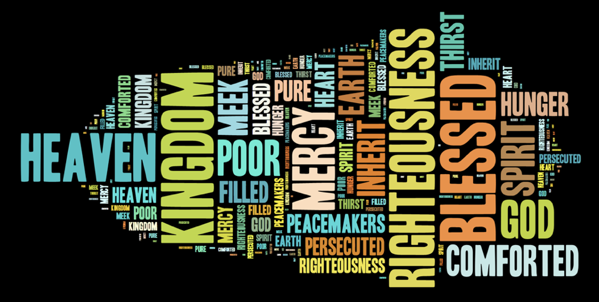“You who are hungry now”
When we read the beautifully written Beatitudes, we must read them in the context of the struggle between harsh poverty and great wealth existing in Jesus’ time. John Dominic Crossan has brought to our understanding the conditions of social life in first century Palestine. Powerful men built great cities to reflect their own glory and name, and these cities created a huge drain on the resources of the area. The poor, as always, were exploited even more than they had been, as resources, especially food crops, were redirected to feed the needs of the city–rural values exploited by urban values. To understand the dynamics, you have to imagine a despot building palaces for his own pleasure and pride at the expense of his poor countrymen: think of Saddam Hussein and his many palaces, or Ceausescu of Rumania. The farmers of Jesus’ time were little more than indentured servants, virtual slaves, paying larger and larger portions of the fruits of their labours to their landlords and overlords, surviving at near subsistence levels. In this social context the Lord’s prayer for daily bread takes on an intense urgency.
Like me, you are probably very familiar with the Beatitudes as found in Matthew’s gospel:
Blessed are the poor in spirit, for theirs is the kingdom of heaven. Blessed are those who mourn, for they will be comforted. Blessed are the meek, for they will inherit the earth.
Blessed are those who hunger and thirst for righteousness,
for they will be filled.
Blessed are the merciful, for they will receive mercy.
Blessed are the pure in heart, for they will see God.
Blessed are the peacemakers, for they will be called the children of God.
Those lines are certainly beautiful poetry, and the English teacher in me is ecstatic, but seen in the social, political context of the first century CE, the Beatitudes are not just pretty words, but a call to action, a call for social revolution.
This thrust becomes clear when we examine how the passage above is different from the version of the Beatitudes found in the earlier gospel of Luke. Luke presents only four Blessings, compared to Matthew’s nine, but they are less ethereal and more earthy:
Blessed are you who are poor, for yours is the kingdom of God.
Blessed are you who are hungry now, for you will be filled.
Blessed are you who weep now, for you will laugh.
Blessed are you when people hate you, and when they exclude you, revile you and de-
fame you…for my sake.
Furthermore, the second half of the poem in Luke’s gospel contains a series of four “woes” to balance the four “blessings”:
Woe to you who are rich, for you have received your consolation. Woe to you who are full now, for you will be hungry.
Woe to you who are laughing now, for you will mourn and weep. Woe to you when all speak well of you,
for that is what their ancestors did to the false prophets.
The New Revised Standard Version from which we read is very close in translation to the King James version; I checked to make sure the contemporary editors weren’t slanting the translation to fit their theological or political agenda.
When analyzing literature it is important to pay attention to repeated words; they are clues to meaning. In both gospels, there is, of course, the repetition of “Blessed,” and in Luke the four “blessed” are balanced with four “woes,” but the other repeated word in Luke’s version is significant–the word “now”:
Blessed are you who are hungry now…
Blessed are you who weep now…
Woe to you who are full now…
Woe to you who are laughing now…
The reference to “now,” to time present, is conspicuously absent from the Beatitudes in Matthew’s gospel: “great is your reward in heaven.” It is no wonder we know and love the Matthew version of the Beatitudes–far more comforting, far more politically and socially safe, for Luke’s series of Woes are also omitted. Matthew’s “Blessed are you who hunger and thirst after righteousness” is far more abstract and therefore less challenging than the very concrete statement in Luke: “Blessed are you who are hungry now.” The Beatitudes of Luke’s gospel are clearly a call to action, a warning to the wealthy: how long must the poor and the marginalized wait for the blessings of God? But the political and social context is nevertheless underlying Matthew’s version, just as they did in his version of the nativity.
In both gospels Jesus spoke to the wealthy about their obligations to meet the needs of the poor. Jesus talked more about money than he did about heaven or prayer; after “the Kingdom,” Jesus talked about money more than anything else. He was trying to make people, especially wealthy and religious people, realize that how they think about money is a major factor in determining their spiritual growth. “You can not serve God and Mammon.” The power of money was the number one idol in Jesus’ time, and it remains so in our culture. We really cannot grow spiritually beyond what we do with our wealth: “Woe to you who are full now.” We in Canada, in the Northern and Western developed nations, are richly blessed. We must share. The good news of Jesus is as simple as that. The actual bread and wine are to be shared. The multitudes are to be fed very real loaves and fishes. The gifts of God for the people of God, now.

